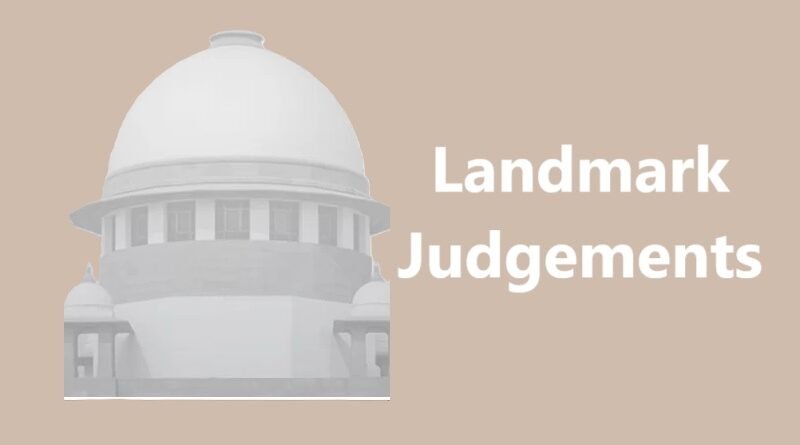Nandini Satpathy v. P.L. Dani (1978) – A Landmark Case on the Right Against Self-Incrimination
Introduction
The case of Nandini Satpathy v. P.L. Dani (1978) is a landmark judgment by the Supreme Court of India, which elaborated on the right against self-incrimination as guaranteed under Article 20(3) of the Constitution of India. This case is significant in protecting individuals from coercive police interrogation and reinforcing the rights of accused persons under Indian law.
Background of the Case
Facts of the Case
Nandini Satpathy was a former Chief Minister of Odisha. She was summoned for questioning in connection with a corruption case under the Prevention of Corruption Act, 1947. During the interrogation by P.L. Dani, a Deputy Superintendent of Police, she was asked multiple questions, many of which she refused to answer, citing her right against self-incrimination under Article 20(3) of the Indian Constitution.
Subsequently, she was prosecuted under Section 179 of the Indian Penal Code (IPC) for refusing to answer the questions put forth by the investigating officer. She challenged the prosecution, arguing that compelling her to answer would violate her fundamental rights under Article 20(3).
Legal Issues
- Whether compelling an accused person to answer questions during an investigation violates Article 20(3) of the Constitution?
- Whether the privilege against self-incrimination extends to a person who has been called for questioning but not yet formally charged?
- Whether the refusal to answer questions by the accused amounts to an offense under Section 179 of IPC?
Arguments
Arguments by Nandini Satpathy
- She argued that under Article 20(3), no person accused of an offense can be compelled to be a witness against themselves.
- Since the investigation involved allegations against her, she fell within the definition of an “accused” even if formal charges were not yet framed.
- Any coercion to make her answer would be unconstitutional.
Arguments by the State
- The prosecution contended that she was merely being questioned and had not yet been formally accused.
- They argued that refusing to answer questions under such circumstances could be penalized under Section 179 of IPC, which criminalizes refusal to answer lawful questions by a public servant.
- The privilege against self-incrimination, according to the prosecution, was only available once formal charges were framed.
Judgment
Ruling by the Supreme Court
The Supreme Court, in its ruling, upheld Nandini Satpathy’s right against self-incrimination and clarified the scope of Article 20(3):
- Applicability of Article 20(3) Before Formal Accusation:
- The Court ruled that the protection under Article 20(3) is not limited to persons who have been formally accused in a court of law.
- Even individuals who are under investigation and are likely to be charged in the future are entitled to this protection.
- Right to Silence and Protection Against Coercion:
- The Court held that forcing an accused to answer questions during interrogation violates Article 20(3).
- Investigating officers do not have the right to compel a person to answer incriminatory questions.
- No Punishment Under Section 179 IPC:
- The Court ruled that if an individual refuses to answer questions that might incriminate them, they cannot be punished under Section 179 IPC.
- The principle of self-incrimination takes precedence over the requirement to answer lawful questions by a public servant.
Interpretation of “Compulsion”
The Court emphasized that compulsion includes both physical and psychological pressure. Any attempt by the police to extract a confession or forcefully obtain statements violates constitutional protections.
Significance of the Judgment
- Expanded Scope of Article 20(3):
- The ruling clarified that the right against self-incrimination applies not only in court trials but also during police investigations.
- Protection Against Police Misconduct:
- The judgment served as a safeguard against the misuse of power by investigating officers, preventing forced confessions and undue pressure on suspects.
- Upholding Human Rights:
- The ruling reinforced fundamental rights and promoted a fair legal process where individuals cannot be compelled to testify against themselves.
- Impact on Future Cases:
- This case has been cited in numerous judgments to protect the rights of accused persons and ensure their fair treatment under law.
Conclusion
The Supreme Court’s decision in Nandini Satpathy v. P.L. Dani (1978) remains a cornerstone of criminal jurisprudence in India, fortifying the fundamental rights of individuals against forced self-incrimination. The judgment expanded the understanding of Article 20(3) of the Indian Constitution and established a precedent ensuring that no person, whether formally accused or under investigation, can be compelled to provide statements that may incriminate them. This ruling serves as a vital protection against police overreach and upholds the principles of justice, fairness, and constitutional rights.


Pingback: Landmark Judgments in India - Bharat Articles